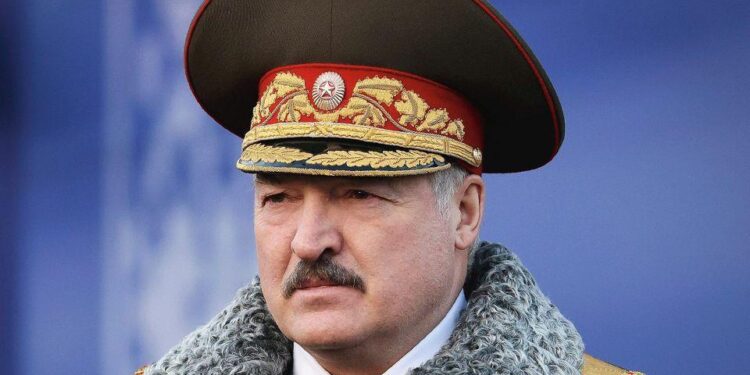Belarusian President Alexander Lukashenko has stated that his country is not requesting the United States to lift the sanctions imposed on it, according to a recent report by BelTA news agency. This development comes amid ongoing tensions between Minsk and Western nations, as Belarus navigates a complex geopolitical landscape marked by international scrutiny and economic restrictions. Lukashenko’s remarks underscore Minsk’s current stance on the sanctions issue, signaling a cautious approach amid continued diplomatic challenges.
Lukashenko Emphasizes Belarus’s Stance on US Sanctions Amid Ongoing Tensions
Belarusian President Alexander Lukashenko reaffirmed his country’s position regarding the ongoing US sanctions, clarifying that Minsk is not seeking their removal through direct appeals. He described the sanctions as a predictable element of international tensions, emphasizing Belarus’s readiness to withstand external pressures without altering its foreign policy course. Lukashenko further highlighted the nation’s commitment to sovereignty and independence, stating that compliance with external demands is not a prerequisite for diplomatic engagement.
The president outlined key points about Belarus’s response to the sanctions, detailing the government’s strategic approach:
- Self-reliance: Strengthening domestic industries to counter economic impacts.
- International cooperation: Pursuing partnerships beyond Western spheres.
- Diplomatic resilience: Maintaining open channels without concession.
| Aspect | Belarus’s Approach |
|---|---|
| Economic Strategy | Diversification and import substitution |
| Diplomatic Messaging | No direct requests to US for sanctions relief |
| Foreign Partnerships | Focus on Eurasian and Asian markets |
Analysis of Belarus-US Relations and the Impact of Current Sanctions
Belarus under President Alexander Lukashenko has maintained a firm stance on its relationship with the United States amid ongoing sanctions. While Minsk has not actively sought the removal of these sanctions, the impact on its economy and international positioning remains significant. The sanctions, primarily targeting key sectors such as finance, energy, and defense, have deepened Belarus’s reliance on allies like Russia and China. Lukashenko’s approach signals a prioritization of sovereignty and resistance to external pressures rather than conciliatory diplomacy.
Key consequences of the sanctions can be categorized as follows:
- Economic Strain: Reduced access to Western markets and investment capital.
- Political Isolation: Limited diplomatic engagement with the US and its allies.
- Energy Dependence: Heightened reliance on Russian energy supplies.
| Sanctioned Sector | Primary Impact | Minsk’s Response |
|---|---|---|
| Finance | Restricted access to international banking | Expanding partnerships with Eastern banks |
| Energy | Limitations on technology imports | Increased cooperation with Russian firms |
| Defense | Arms embargo and equipment bans | Development of domestic military industry |
Expert Recommendations for Navigating Diplomatic Challenges Between Minsk and Washington
In the current climate of strained diplomatic relations between Minsk and Washington, experts underscore the importance of cautious engagement rooted in mutual respect and realistic expectations. While Belarusian President Alexander Lukashenko has publicly stated that Belarus is not requesting the US to lift sanctions, analysts suggest that behind this stance lies a complex dialogue about sovereignty, economic resilience, and geopolitical positioning. Key recommendations for policymakers include:
- Prioritize open channels of communication to prevent misunderstandings and inadvertent escalations.
- Leverage multilateral forums where Belarus and the US can address concerns indirectly, diminishing bilateral tension.
- Focus on targeted cooperation areas such as counter-terrorism and climate initiatives to rebuild trust incrementally.
Moreover, diplomatic strategists encourage both sides to adopt a phased approach in addressing sanctions and political disagreements. Incremental measures, accompanied by transparent benchmarks, could pave the way for gradual normalization without forcing premature concessions. The table below highlights potential diplomatic actions and their anticipated outcomes, serving as a guide for policymakers navigating this delicate balance.
| Diplomatic Action | Expected Outcome | Timeline |
|---|---|---|
| Establish regular working groups | Improved information exchange | Short-term (3-6 months) |
| Engage third-party mediators | Reduced bilateral tensions | Medium-term (6-12 months) |
| Implement conditional sanctions relief | Encouraged policy reforms | Long-term (12+ months) |
Concluding Remarks
In closing, President Alexander Lukashenko’s recent remarks underscore Belarus’s steadfast stance amid ongoing geopolitical tensions. By affirming that Minsk is not requesting Washington to lift sanctions, Lukashenko signals a continued approach of self-reliance and defiance. As international dynamics evolve, the future of Belarus-US relations remains closely watched by global observers.
















